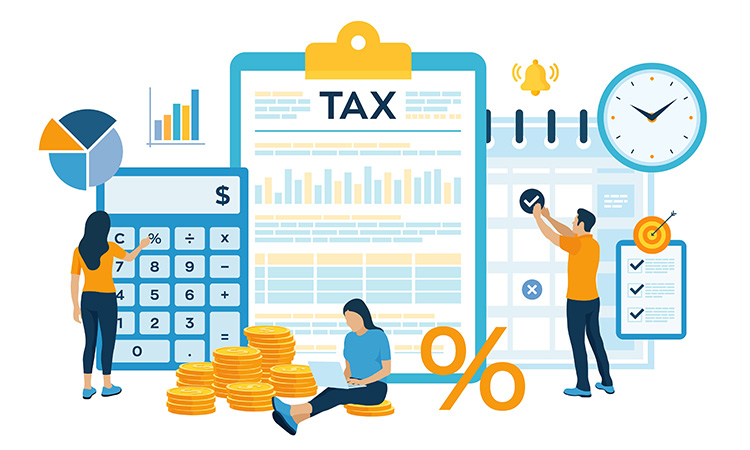There are changes to the taxes you will file in 2024, including some new tax credits for small-business owners that you should be aware of.
These changes will be outlined here, and I will also provide information on general best practices for filing your 2023 tax return.
Oh—and because the IRS intends to increase the number of audits it conducts, a section in this article will help you prepare in case you are on the receiving end of an IRS audit.
Save on Energy
Massage therapists and other small-business owners can save money on energy costs due to the Inflation Reduction Act enacted in 2023. These savings include a tax credit for 30% of the cost of changing to low-cost solar power, reducing operating costs and protection from changing energy prices; and a tax credit of up to $5 per square foot of business space, to be used for energy efficiency improvements (and less expensive utility bills).
Your Mobile Massage Tax Credit
Massage therapists who use a truck or van in their business can benefit from tax credits of up to 30% of the cost of buying a clean—electric or fuel-cell model—commercial vehicle, through the Clean Commercial Vehicle Credit.
Claim Your Business Expenses
Entrepreneurs can take advantage of various tax benefits, including a health-care deduction for self-employed massage therapists, home office deduction, business start-up costs and more. For more information, see Publication 55, Business Expenses.
Depreciation Matters
There is a tax benefit for massage therapists and other small-business people who own a building or equipment, if those have depreciated. For more information, see Publication 946, How to Depreciate Property.
Help with Student Loans
If you maintain an educational assistance program for employees, you can use that program to assist your employees in paying back their student loans.
According to the IRS, “Though educational assistance programs have been available for many years, the option to use them to pay student loans has been available only for payments made after March 27, 2020, and, under current law, will continue to be available until Dec. 31, 2025.”
For more information, see Publication 15-B, Employer’s Tax Guide to Fringe Benefits. For details on what qualifies as a student loan, see Chapter 10 in Publication 970, Tax Benefits for Education.
Mileage
The mileage rate for 2023 is 65.5 cents for every eligible business mile you drove.
Remember: Your daily mileage becomes deductible when it is between two business stops. This is one of the stronger arguments for taking a deduction for a home office, even if you don’t see clients at home. It makes your home a business stop and increases your ability to deduct your mileage.
There are different rules for out-of-town travel and for commuting.
Audits
The IRS is going to be conducting more audits. There are a few simple ways to reduce your chances of being audited:
• Use precise numbers. If you like to round up or round down your numbers so all your amounts on your Schedule C (where so many of us document our business income and expenses) end in 0, the IRS is going to be suspicious.
• Use the correct code for massage therapists at the top of Schedule C. In block A, enter your legal title—licensed massage therapist, certified massage therapist, etc.—rather than just “massage therapist.” In block B, use the appropriate code for massage therapists, 621399. Then, categories like “laundry” won’t raise any eyebrows.
• Work with an accountant. If an accountant completes your return, they also have to sign it. If the IRS sees an accountant’s signature, it lowers your audit risk.
Remember that having a home office does not increase your chance of being audited, although it might have been 30 years ago. Home offices are so common now they are no longer an audit flag.
Losing money doesn’t necessarily increase your audit risk either. Businesses sometimes spend more money than they make.
Here are a few tips for surviving an audit if you’re selected:
• Keep up with your bookkeeping. The IRS won’t audit last year’s return, they’ll audit a return from several years ago. What are the odds you can remember what you spent $32.47 on in 2019?
• Add notes to your bookkeeping. Again, can you remember why you drove 27 miles in 2020 and claimed it as a business expense? A simple note (27 miles: ethics class in Springfield) will save you a lot of mental anguish. It also allows the IRS to cross-check the entry (“Oh, look, she’s got a $50 expense the month before for the registration for “Springfield ethics class.”)
• Know your deductions. Know what is and isn’t allowed as a business deduction. What is common sense to you (“I’ll deduct these shoes because I only wear them in the office”) doesn’t mean it’s common sense to the IRS or that it’s legal (no, you can’t deduct the shoes).
Work with an accountant. If an accountant does your taxes, they may have to be at the audit and may be liable for any errors and associated penalties.
Remember: being selected for an audit It doesn’t mean you did anything wrong. The IRS randomly selects returns for audits every year. Maybe you just got lucky?
Online Payment Apps
Do you accept payment through apps like Venmo, CashApp, or Zelle? You’ve always been required to report that income and you’ve always been able to take any charges as business expenses.
Last year the IRS expanded the reporting requirements of those companies. If you processed more than $600 through an app, you (and the IRS) will receive a 1099K from the company. (Note: Zelle is exempt from this change, meaning there is no reporting requirement related to payments received via Zelle.)
If you use the apps for both business and personal transactions, you’ll need to document which transactions were business and which were personal.
Speaking of payment processing, if you share a more traditional payment-processing device or service with another person, one of you probably reimburses the other for the costs of their transactions. The person who receives the reimbursement needs to record the reimbursement as income. If it’s more than $600, the person giving the reimbursement also needs to issue a 1099MISC to the person they gave the money to and to the IRS.
Entertainment
Do you ever take clients out to a game, a show, or some other form of entertainment as a business? You cannot take any deductions for that anymore.
Meals
In 2022 the IRS made a significant change to the meals deduction, and that change is still in effect: If you spend the money in a sit-down restaurant you can deduct 100%. If you get the food at a food truck, carry-out place, or grocery store you can only deduct 50%.
Schedule C has a place (line 24B) to specify whether your food expense was the 100% type or the 50% type, so make sure you’ve put those in your bookkeeping correctly.
Qualified Business Income (QBI)
This came to us as part of the 2018 tax bill. Depending on your taxable income, you may be able to apply for an additional deduction—the QBI deduction—to your taxes. There are thresholds that affect how much work you need to do to take this deduction. Those thresholds are going up in 2023.
QBI isn’t simple and you may need a tax professional to work it out.
Digital (Crypto) Currency
I don’t know if many massage therapists used crypto currency for business expenses (or accepted payment) in 2023, but if you did there is a new line on your 1040 (not your Schedule C) that asks about your digital assets. Cryptocurrency is a digital asset.
Retirement Contributions
This isn’t technically a business expense, but if you are a self-employed person you may be having to self-fund your retirement. The maximum amount you can contribute went up in 2023—so take care of future-you and drop some additional change in your retirement accounts.
3 Secrets To A (Mostly) Painless Tax Time
If tax time puts you in Super Anxiety Mode, there are a few things you can do reduce your anxiety.
1. Write It Down
Yes, I’m talking about bookkeeping. Up-to-date bookkeeping is one of the nicest things you can give your business and yourself. If you have daily transactions—client payments, expenses—write them down every day.
With practice, it can take three to four minutes. (Yes, I timed myself.)
So many of your transactions are the same, so you’ll get quick at entering them. The longer you wait to enter a transaction, the more likely you are to forget something. (For me, it’s mileage.)
Absolutely the best part? It takes me no more than 30 minutes in February to prepare the report for my accountant for my taxes (and most of that is correcting the data-entry errors I made throughout the year that become glaringly obvious in the report).
Use whatever bookkeeping method you want. Pen and paper, Excel, an account book, a bookkeeping program. Which one do you find the least intimidating and are most comfortable with? Use that.
2. Learn the Truth
Find a good reference book or class about deductions for massage therapists. Check them regularly (something changes every year). Even if you use a bookkeeper or accountant, they are only as good as the information you hand them. If you’re handing them bad information, such as about deductions you can or can’t take) they can’t do a good job for you.
Don’t rely on “common sense” (because it’s not one of the standards the IRS uses) and don’t rely on “I heard / my uncle told me….” from strangers online. I admit I am often online and trying to answer deductions questions online but I’ll cite my sources.
3. Don’t Trust Your Memory
Don’t just enter the money you spent or made. Add notes that help you remember details when you need to. Why did you drive 37 miles on June 3? Was everything you bought at the office supply store on August 1 for your business? What percentage of your cell phone bill are you taking as a business deduction?
Make notes. Don’t trust your memory!

About the Author
Kelly Bowers is the owner of the Healing Arts Business Academy and a retired massage therapist. She is the author of four books: Can I Deduct That?” “The Affordable Massage Handbook,” “The Accidental Business Owner” and “Between Doormat and Diva.” She is a regular presenter at national conferences, an instructor in professional training programs, and an NCBTMB Approved CE Provider. You can find her on Facebook, Instagram and YouTube. She lives in Durham, North Carolina.
